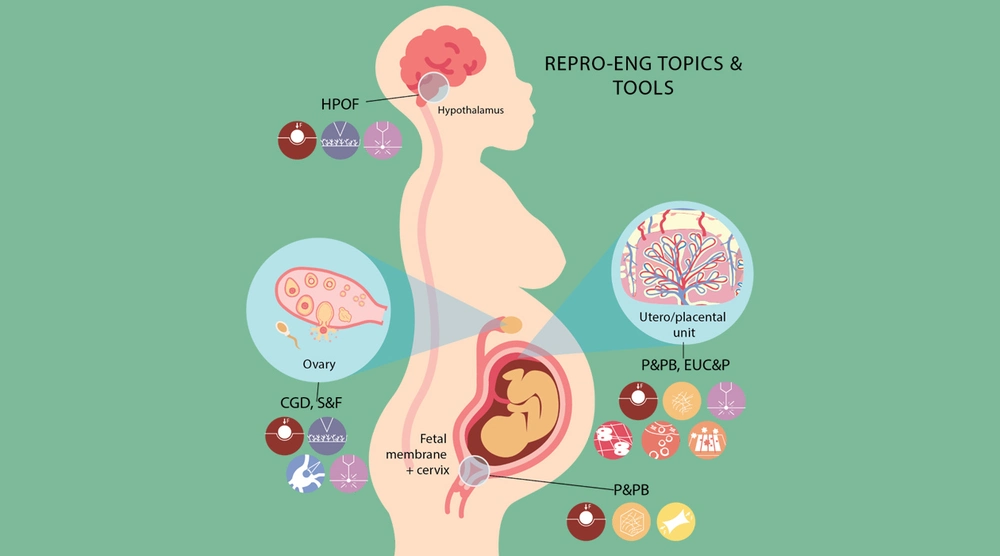
The National Institutes of Health has approved the T32 grant, “Interdisciplinary Research Training at the Interface of Reproductive Sciences and Bioengineering." The training program is aimed at predoctoral students who want to work at the interface of reproductive sciences and engineering, two long-standing areas of research excellence at the University of Illinois Urbana-Champaign.
“Both the White House and the National Science Foundation have been emphasizing the importance of looking at women’s health. This grant is timely because we can use experts across the campus to bring biology and engineering together,” said Amy Wagoner Johnson, a professor of mechanical science and engineering and a co-director on the grant.
The program will draw from the rich history of interdisciplinary research, especially members of the Beckman Institute for Advanced Science and Technology, Carl R. Woese Institute for Genomic Biology, and the Carle Illinois College of Medicine. The work will focus on germ cell development, hypothalamic-pituitary-ovarian function, spermatogenesis and fertilization, embryo-uterine crosstalk and pregnancy, and placentation and preterm birth.
“This is the first time this particular T32 grant has been approved on our campus and we are excited to have biologists and engineers work on different aspects of reproduction,” said Indrani Bagchi, a professor of comparative biosciences and a co-director on the grant.
The program will also emphasize co-mentorship of trainees by engineers and reproductive scientists, course requirements in both disciplines, and science communication, which will enhance team science endeavors.
“Training grants offer graduate students much more than just a stipend,” said Lori Raetzman, a professor of Molecular & Integrative Physiology and the Associate Director for School of MCB PhD Programs. “They help form a community where students gather for seminars, professional development, and career advice. This particular grant focuses on interdisciplinary research, exposing students to cutting edge team science.”
Illinois has a long history of research and training in reproductive biology. Professors Andrew Nalbandov and Jack Gorski, pioneers in reproductive sciences, were instrumental in obtaining the first NIH Reproductive Biology Training Grant in Illinois in 1972.
“With the recent award of the ReproEng training grant by the NIH, we are carrying on this tradition with an exciting new approach,” said Milan Bagchi, Director of the School of Molecular & Cellular Biology and a participating reproductive scientist. “Our focus is on the intersection of engineering and reproductive sciences to train the next generation of researchers. The application of engineering principles and tools will enable us to advance the field of reproductive sciences in ways that would not be possible otherwise.”
Among the participating faculty are five researchers from the School of Molecular & Cellular Biology. They are as follows:
Milan Bagchi, the Deborah Paul Professor of Molecular & Cellular Biology and Director of the School of Molecular & Cellular Biology, studies the molecular pathways regulated by estrogen and progesterone during growth and differentiation of hormone-responsive tissues. His laboratory works to characterize the hormonal mechanisms regulating embryo implantation and fertility.
Catherine Christian-Hinman, an associate professor of Molecular & Integrative Physiology, conducts research at the intersection of neuroscience, physiology, and endocrinology. Her laboratory studies the neural mechanisms linking epilepsy and comorbid reproductive endocrine disorders.
Erik Nelson, an associate professor of Molecular & Integrative Physiology, is a cancer and drug discovery researcher focusing on endocrine and metabolic control of breast and ovarian cancer pathophysiology.
Lori Raetzman, a professor of Molecular & Integrative Physiology, investigates signaling pathways in hypothalamic-pituitary gland development and disease.
Kai Zhang, an associate professor of Biochemistry, studies signal transduction regulation of cell fate determination and the ways in which normal signaling processes are compromised in diseased conditions.
Main photo illustration by Jillian Nickell